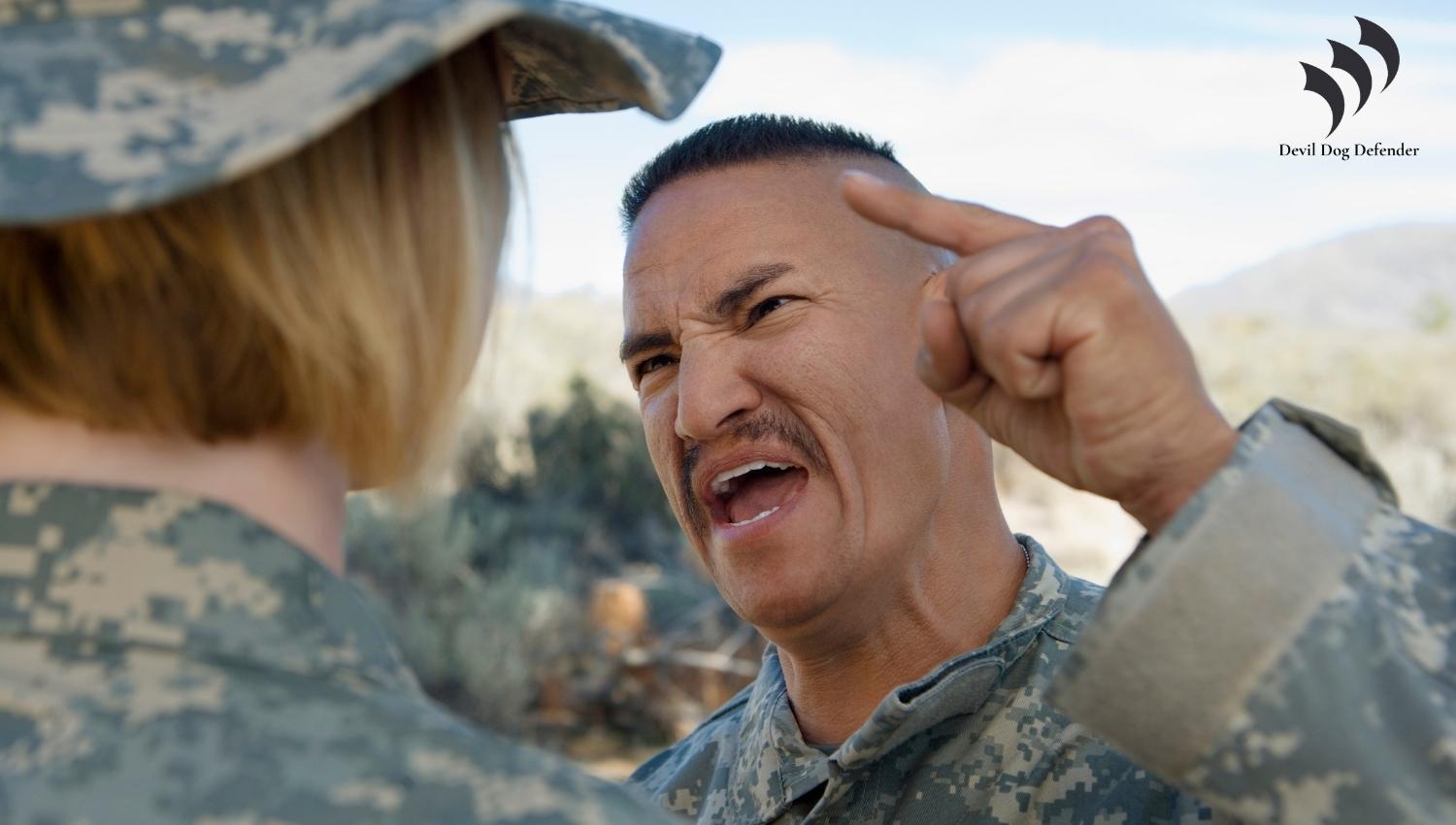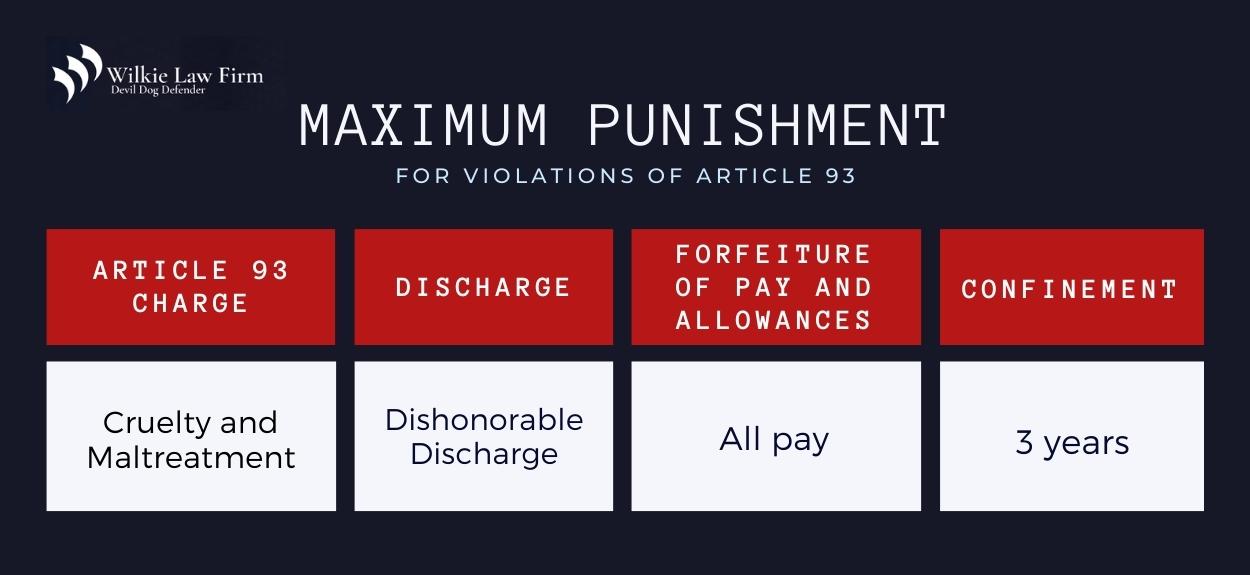Article 93 UCMJ
Military Defense Attorney for Article 93 Violations
Home » UCMJ Articles » Article 93 UCMJ
Military Counsel
UCMJ Articles
UCMJ Article 93 - Cruelty and Maltreatment
Table of Contents
In the United States, while every citizen is bound by the overarching principles of common law, those who serve in the military are subject to an additional and distinct set of legal guidelines. These guidelines are designed specifically to address the unique challenges and responsibilities of military life. Known as the Uniform Code of Military Justice (UCMJ), this codified system of military laws ensures that service members adhere to a high standard of behavior and conduct.
The UCMJ is structured into a series of articles, each detailing specific rules, regulations, and potential violations of military law. The UCMJ articles are not just about punitive measures; they exist to promote and ensure morale, good order, and discipline across all branches of the armed forces. In essence, they provide a roadmap for service members, detailing both their rights and their obligations, emphasizing the importance of upholding honor and integrity in the military.
Among these articles is UCMJ Article 93, which covers the crime of cruelty and maltreatment in the military. This article highlights the military’s commitment to humane treatment and the prevention of abuse within its ranks. Below, North Carolina military defense attorney Aden Wilkie of the The Wilkie Law Group offers insights and explanations into UCMJ Article 93.
What is Article 93 of the UCMJ?
Article 93 of the Uniform Code of Military Justice (10 U.S.C. 893) covers the offense known as “cruelty and maltreatment,” which essentially means treating others in a cruel, harsh, or harmful way. There are a number of actions that may constitute this charge. Things like assaulting someone, punishing them in a way that’s not right, or sexually harassing them can all fall under this rule.
It should be noted that just because a task that is assigned to a service member is hard or risky doesn’t necessarily mean it’s considered cruelty or mistreatment. Enforcing necessary or proper duties, so long as they are appropriate for the job at hand, is not a violation of this rule. It is only when objectively abusive conduct occurs that it becomes a problem.
The exact definition of cruelty and maltreatment, as prescribed by Article 93 of the UCMJ, is provided below:
“Any person subject to this chapter who is guilty of cruelty toward, or oppression or maltreatment of, any person subject to his orders shall be punished as a court-martial may direct.”

Elements of UCMJ Article 93
According to the Manual for Courts-Martial, the elements that are required for an Article 93 charge to stick are as follows:
- That a certain person was subject to the orders of the accused; and
- That the accused was cruel toward, or oppressed, or maltreated that person.
To prove cruelty, oppression, or maltreatment, the prosecution does not need to prove that the alleged victim actually suffered physical or mental harm, but rather that the accused’s actions reasonably could have caused mental harm or suffering.
Understanding Article 93 UCMJ
In order to grasp a full understanding of Article 93, it is important that the accused understands the nature of the crime, which includes the nature of the victim and the nature of the act itself.
Nature of Victim
“Any person subject to orders” doesn’t just mean service members who directly report to the person in charge. It includes anyone, whether they’re part of the military or not, who has a duty to follow that person’s orders. This can be the case even if the person giving the orders isn’t in their direct chain of command. In simpler terms, if you have a reason to listen to someone’s commands because of your job or role, you’re considered “subject to their orders.”
Nature of Act
Behaving in a cruel, harsh, or harmful way toward others isn’t always necessarily physical. We judge this behavior based on a fair and objective standard. Acts like assault, improper punishment, or sexually harassing another person can be considered a violation of this rule. Sexual harassment can include things like trying to use job perks or threats about someone’s job to get sexual favors, or continuously making unwanted and inappropriate sexual remarks or actions.
Examples of Cruelty and Maltreatment in the Military
Cruelty and maltreatment can manifest in a number of different ways within a military context. Here are some of the more common examples:
- Physical Abuse: Subjecting a service member to unwarranted physical harm or punishment.
- Verbal Abuse: Continually berating, shouting at, or belittling a subordinate to an excessive degree.
- Withholding Basic Necessities: Deliberately denying a service member food, sleep, or other basic needs as a form of punishment.
- Sexual Harassment: Using one’s position of authority to demand sexual favors or making repeated unwanted sexual advances or comments.
- Improper Punishment: Inflicting punishments that aren’t sanctioned or are inappropriate for the alleged misconduct at hand.
- Unfair Work Assignments: Continuously assigning a service member dangerous, demeaning, or unnecessarily challenging tasks without a valid reason.
- Isolation or Ostracism: Intentionally isolating a service member from their peers or group activities as a form of punishment or maltreatment.
- Retaliation: Targeting a service member with unfair treatment because they reported misconduct or a violation.
- Withholding Professional Opportunities: Denying training, assignments, or other opportunities as a means of punishment or discrimination.
While these are just some examples, it’s important to understand that each situation is unique. The context, severity, and frequency of the behavior are all factors that would be considered when determining if an action qualifies as cruelty or maltreatment under Article 93 of the UCMJ.
What is the Punishment for Violations of Article 93 UCMJ?
The penalties for a cruelty or maltreatment conviction can be severe, including a loss of pay and benefits, jail time, and discharge from the service. According to the statute, the maximum punishment for those found guilty of an Article 93 violation include:
- Forfeiture of all pay and allowances;
- Confinement for up to 3 years;
- Dishonorable discharge.

Why You Need an Experienced Military Defense Attorney for UCMJ Violations
Service members facing allegations of UCMJ article violations of any kind may find themselves in a challenging situation where not just their career but their very freedom may hang in the balance. As such, every case requires a thorough understanding of all the circumstances surrounding the alleged offense and a meticulous evaluation of the evidence presented, especially those involving Article 93 violations. That is where a seasoned military defense lawyer like Aden Wilkie of The Wilkie Law Group comes in.
With such charges as cruelty or maltreatment, accusations might sometimes arise from misunderstandings, interpersonal conflicts, or even false allegations. That is why it’s absolutely crucial for the defense to scrutinize every piece of information and build a strong defense strategy. In North Carolina, where military roots run deep, having an advocate who understands the ins and outs of both military culture and the UCMJ is invaluable. A dedicated defense attorney like Aden Wilkie will leave no stone unturned to ensure that his clients receive a fair hearing and the most favorable outcome possible in their unique case.
Beyond building a solid legal defense and handling all matters related to court-martial and military criminal justice, Aden Wilkie also offers unparalleled legal guidance on things like military discharge upgrades and record corrections. Based in Jacksonville, NC, The Wilkie Law Group extends its services to Camp Lejeune and Fort Bragg, while also catering to various other bases, camps, and military facilities throughout the country.
This content is intended for general informational purposes. Once you establish an attorney-client relationship with Aden Wilkie, he will provide a more in-depth understanding of your legal options concerning your Article 93 case.
Contact an Article 93 Defense Attorney
You’ve committed your life to your country’s service; it’s time for us to stand by you and shield your future during these challenging times. Reach out to our seasoned legal professionals at The Wilkie Law Group for a private consultation at (910) 333-9626 or complete our online intake form to connect with us today.





